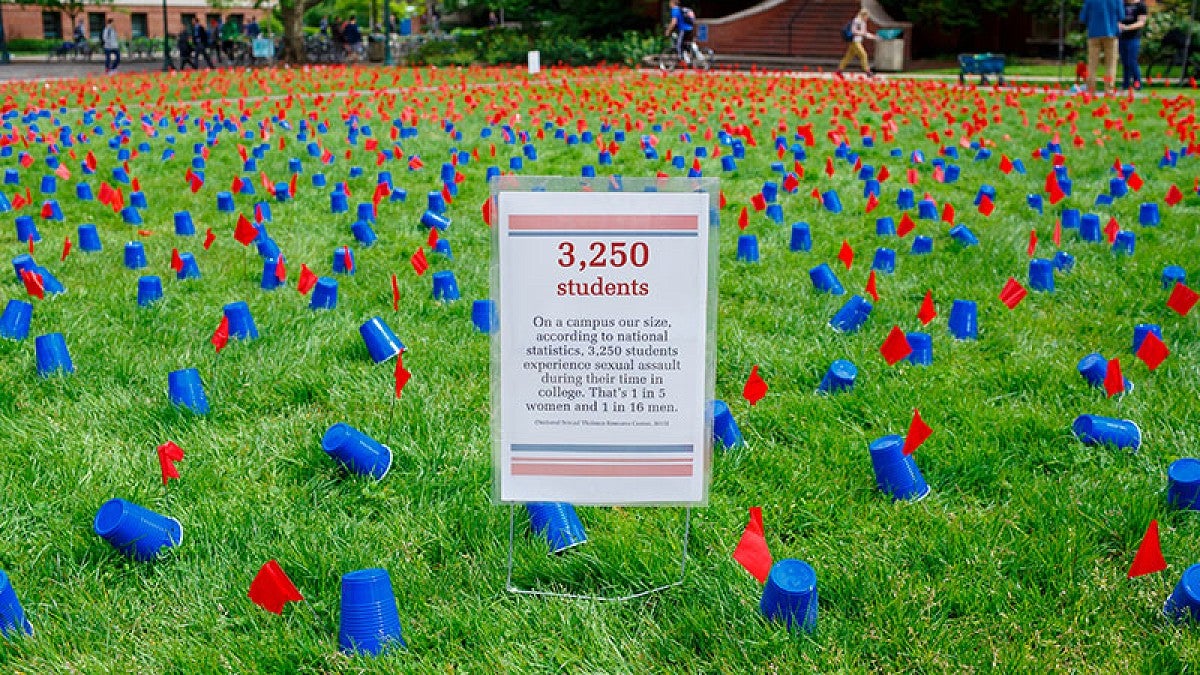A review of mandatory reporting or compelled disclosure policies at 150 universities in connection with how they deal with sexual assaults has raised questions about their effectiveness and their impacts on victims.
The reasoning behind the policies is not supported by existing research, concluded UO psychologist Jennifer Freyd and two colleagues in a paper published in the journal American Psychologist.
In their paper, the researchers call for survivor-centered reforms and offer four alternative approaches for institutions to consider as they seek to comply with federal laws and guidelines.
"What we show in our study is that we lack evidence that mandatory reporting is safe and effective," said Freyd, a professor in the UO Department of Psychology. "In fact, the data point in the opposite direction — that many of the policies we that we reviewed are neither safe nor effective."
Psychologists Lilia M. Cortina of the University of Michigan and Kathryn J. Holland of the University of Nebraska are co-authors on the paper. Holland was a doctoral student at Michigan during the research.
Many university policies, while still evolving, require employees who've heard a student's report of a sexual assault to notify university officials and, in some cases, the police, regardless of the wishes of the victim. Interpretations of Title IX and the Clery Act have driven the policies.
Title IX prohibits sex discrimination in educational programs receiving federal dollars and requires prompt and equitable responses by institutions. Under updated federal guidance on the civil rights law, compelled disclosure was introduced for responsible employees, but that designation has been open to interpretation. The Clery Act requires institutions to collect and publish information about the prevalence of sex-related crimes on and near a campus.
For their article, Holland, the study’s lead author, led a comprehensive review of the reporting policies randomly selected to represent 50 large, 50 medium and 50 small four-year, not-for-profit colleges and universities, none of which were named. Fifty-two percent were public and 48 percent were private.
Of those, 97 percent had policies mandating that certain employees report sexual assault disclosed to them by a student. The vast majority of the policies require all, or nearly all, employees to report disclosures, while a few had a more specific and selective list of mandatory reporters.
They found limited research supporting rationales for compelled disclosure. “In fact,” the researchers wrote in their conclusion, “some evidence suggests that these mandates may carry negative consequences: silencing and disempowering survivors, complicating employees’ jobs, and prioritizing legal liability over student welfare.”
The researchers also generated four alternative approaches featuring victim-centered goals that could protect everyone, including the institutions, in sexual assault cases and meet Title IX goals of investigating and prosecuting assaults, assisting survivors, deterring future assaults and enhancing campus security.
“It is really important not to harm abuse victims,” Freyd said. “One way adult victims can get harmed is by taking away their autonomy. Mandatory reporting policies tend to do exactly that and thus are likely to cause harm. There are alternatives that are more consistent with the evidence we do have.”
The UO’s Freyd is a leading voice on issues of sexual harassment. In June, she spoke on “Moving from Institutional Betrayal to Institutional Courage" in a workshop held by the National Academies of Sciences, Engineering and Medicine. She also was a contributor to the White House Task Force to Protect Students from Sexual Assault and was present in 2014 when the Obama administration rolled out proposed guidelines for combating sexual violence.
In one alternative suggested by Freyd and her co-authors, university employees who receive a student’s report of sexual assault would be allowed to respect the victim’s choice on disclosure and to whom an incident may be reported. Such an approach would allow for a change in action if a victim later reconsiders.
Freyd initially suggested this alternative in an April 2016 essay for the Huffington Post. The UO revised its reporting policy, effective Sept 15, to reflect this approach.
In a second approach, a student may report an incident and get services and choose whether an investigation should be launched. A similarly adopted policy by the U.S. Department of Defense, the researchers noted, helped increase reporting and resulted in more positive experiences by victims.
A third alternative suggests third-party, online technologies that allow victims to consider their options for reporting and obtaining services. Such a system, the researchers wrote, would allow for a time-stamped electronic record, including photographic evidence, for use if the student chooses to request an investigation. It also would allow for an automatic trigger for advancing the report if another student later files a report involving the same perpetrator.
The fourth alternative calls for a blended approach of the alternatives, recognizing that institutions may be hesitant to give up compelled disclosure policies in light of federal directives. “The aims could be to decrease involuntary disclosures while increasing voluntary ones,” the researchers wrote.
—By Jim Barlow, University Communications


